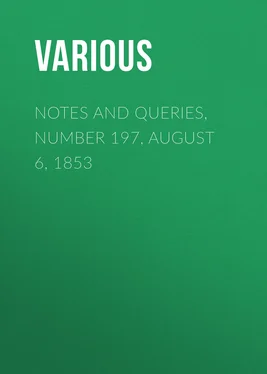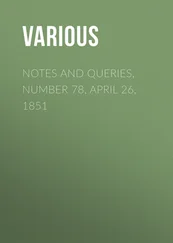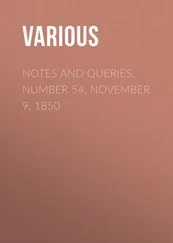Various - Notes and Queries, Number 197, August 6, 1853
Здесь есть возможность читать онлайн «Various - Notes and Queries, Number 197, August 6, 1853» — ознакомительный отрывок электронной книги совершенно бесплатно, а после прочтения отрывка купить полную версию. В некоторых случаях можно слушать аудио, скачать через торрент в формате fb2 и присутствует краткое содержание. Жанр: foreign_antique, periodic, foreign_edu, на английском языке. Описание произведения, (предисловие) а так же отзывы посетителей доступны на портале библиотеки ЛибКат.
- Название:Notes and Queries, Number 197, August 6, 1853
- Автор:
- Жанр:
- Год:неизвестен
- ISBN:нет данных
- Рейтинг книги:4 / 5. Голосов: 1
-
Избранное:Добавить в избранное
- Отзывы:
-
Ваша оценка:
- 80
- 1
- 2
- 3
- 4
- 5
Notes and Queries, Number 197, August 6, 1853: краткое содержание, описание и аннотация
Предлагаем к чтению аннотацию, описание, краткое содержание или предисловие (зависит от того, что написал сам автор книги «Notes and Queries, Number 197, August 6, 1853»). Если вы не нашли необходимую информацию о книге — напишите в комментариях, мы постараемся отыскать её.
Notes and Queries, Number 197, August 6, 1853 — читать онлайн ознакомительный отрывок
Ниже представлен текст книги, разбитый по страницам. Система сохранения места последней прочитанной страницы, позволяет с удобством читать онлайн бесплатно книгу «Notes and Queries, Number 197, August 6, 1853», без необходимости каждый раз заново искать на чём Вы остановились. Поставьте закладку, и сможете в любой момент перейти на страницу, на которой закончили чтение.
Интервал:
Закладка:
"A pack or party of scandalous, wicked, and profane men, who appropriate to themselves the name of High Church (but may more properly be said to be Jesuits or Papists in masquerade), do take liberty to teach, preach, and print, publickly and privately, sedition, contentions, and divisions among the Protestants of this kingdom."— Motives to Union , p. 1.
"These men glory in their being members of the High Church (Popish appellation, and therefore they are the more fond of that); but these pretended sons are become her persecutors, and they exercise their spite and lies both on the living and the dead."— The Snake in the Grass brought to Light , p. 8.
"Our common people of the High Church are as ignorant in matters of religion as the bigotted Papists, which gives great advantage to our Jacobite and Tory priests to lead them where they please, or to mould them into what shapes they please."— Reasons for an Union , p. 39.
"The minds of the populace are too much debauched already from their loyalty by seditious arts of the High Church faction ."— Convocation Craft , p. 34.
"We may see how closely our present Highflyers pursue the steps of their Popish predecessors, in reckoning those who dispute the usurped power of the Church to be hereticks, schismaticks, or what else they please."— Ib. p. 30.
"All the blood that has been spilt in the late unnatural rebellion, may be very justly laid at the doors of the High Church clergy ."— Christianity no Creature of the State , p. 16.
"We see what the Tory Priesthood were made of in Queen Elizabeth's time, that they were ignorant, lewd, and seditious: and it must be said of 'em that they are true to the stuff still."— Toryism the Worst of the Two , p. 21.
" The Tories and High Church , notwithstanding their pretences to loyalty, will be found by their actions to be the greatest rebels in nature."— Reasons for an Union , p. 20.
Sir W. Scott, in his Life of Dryden , Lond. 1808, observes that—
"Towards the end of Charles the Second's reign, the High-Church-men and the Catholics regarded themselves as on the same side in political questions, and not greatly divided in their temporal interests. Both were sufferers in the plot, both were enemies of the sectaries, both were adherents of the Stuarts. Alternate conversion had been common between them, so early as since Milton made a reproach to the English Universities of the converts to the Roman faith daily made within their colleges: of those sheep—
'Whom the grim wolf with privy paw
Daily devours apace, and nothing said.'"
I quote this passage partly because it gives Sir Walter's interpretation of that obscure passage in Lycidas , respecting which I made a Query (Vol. ii., p. 246.), but chiefly as a preface to the remark that in James II.'s reign, and at the time these party names originated, the Roman Catholics were in league with the Puritans or Low Church party against the High Churchmen, which increased the acrimony of both parties.
In those days religion was politics, and politics religion, with most of the belligerents. Swift, however, as if he wished to be thought an exception to the general rule, chose one party for its politics and the other for its religion.
"Swift carried into the ranks of the Whigs the opinions and scruples of a High Church clergyman… Such a distinction between opinions in Church and State has not frequently existed: the High Churchmen being usually Tories , and the Low Church divines universally Whigs ."—Scott's Life , 2nd edit.: Edin. 1824, p. 76.
See Swift's Discourse of the Contests and Dissensions between the Nobles and Commons of Athens and Rome: Lond. 1701.
In his quaint Argument against abolishing Christianity , Lond. 1708, the following passage occurs:
"There is one advantage, greater than any of the foregoing, proposed by the abolishing of Christianity: that it will utterly extinguish parties among us by removing those factious distinctions of High and Low Church , of Whig and Tory , Presbyterian and Church of England."
Scott says of the Tale of a Tub:
"The main purpose is to trace the gradual corruptions of the Church of Rome, and to exalt the English Reformed Church at the expense both of the Roman Catholic and Presbyterian establishments. It was written with a view to the interests of the High Church party."— Life , p. 84.
Most men will concur with Jeffrey, who observes:
"It is plain, indeed, that Swift's High Church principles were all along but a part of his selfishness and ambition; and meant nothing else, than a desire to raise the consequence of the order to which he happened to belong. If he had been a layman, we have no doubt he would have treated the pretensions of the priesthood as he treated the persons of all priests who were opposed to him, with the most bitter and irreverent disdain."— Ed. Rev. , Sept. 1846.
The following lines are from a squib of eight stanzas which occurs in the works of Jonathan Smedley, and are said to have been fixed on the door of St. Patrick's Cathedral on the day of Swift's instalment (see Scott, p. 174.):
"For High Churchmen and policy,
He swears he prays most hearty;
But would pray back again to be
A Dean of any party."
This reminds us of the Vicar of Bray, of famous memory, who, if I recollect aright, commenced his career thus:
"In good King Charles's golden days,
When loyalty no harm meant,
A zealous High Churchman I was,
And so I got preferment."
How widely different are the men we see classed under the title High Churchmen! Evelyn and Walton 4 4 Of Izaak Walton his biographer, Sir John Hawkins, writing in 1760, says, "he was a friend to a hierarchy, or, as we should now call such a one, a High Churchman ."
, the gentle, the Christian; the arrogant Swift, and the restless Atterbury.
It is difficult to prevent my note running beyond the limits of "N. & Q.," with the ample materials I have to select from; but I cannot wind up without a definition ; so here are two:
"Mr. Thelwall says that he told a pious old lady, who asked him the difference between High Church and Low Church , 'The High Church place the Church alcove Christ, the Low Church place Christ above the Church.' About a hundred years ago, that very same question was asked of the famous South:—'Why,' said he, 'the High Church are those who think highly of the Church, and lowly of themselves; the Low Church are those who think highly of themselves, and lowly of the Church."—Rev. H. Newland's Lecture on Tractarianism , Lond. 1852, p. 68.
The most celebrated High Churchmen who lived in the last century, are Dr. South, Dr. Samuel Johnson, Rev. Wm. Jones of Nayland, Bp. Horne, Bp. Wilson, and Bp. Horsley. See a long passage on "High Churchmen" in a charge of the latter to the clergy of St. David's in the year 1799, pp. 34. 37. See also a charge of Bp. Atterbury (then Archdeacon of Totnes) to his clergy in 1703.
Jarltzberg.CONCLUDING NOTES ON SEVERAL MISUNDERSTOOD WORDS
Not being minded to broach any fresh matter in "N. & Q.," I shall now only crave room to clear off an old score, lest I should leave myself open to the imputation of having cast that in the teeth of a numerous body of men which might, for aught they would know to the contrary, be as truly laid in my own dish. In No. 189., p. 567., I affirmed that the handling of a passage in Cymbeline , there quoted, had betrayed an amount of obtuseness in the commentators which would be discreditable in a third-form schoolboy. To substantiate that assertion, and rescue the disputed word "Britaine" henceforth for ever from the rash tampering of the meddlesome sciolist, I beg to advertise the ingenuous reader that the clause,—
Читать дальшеИнтервал:
Закладка:
Похожие книги на «Notes and Queries, Number 197, August 6, 1853»
Представляем Вашему вниманию похожие книги на «Notes and Queries, Number 197, August 6, 1853» списком для выбора. Мы отобрали схожую по названию и смыслу литературу в надежде предоставить читателям больше вариантов отыскать новые, интересные, ещё непрочитанные произведения.
Обсуждение, отзывы о книге «Notes and Queries, Number 197, August 6, 1853» и просто собственные мнения читателей. Оставьте ваши комментарии, напишите, что Вы думаете о произведении, его смысле или главных героях. Укажите что конкретно понравилось, а что нет, и почему Вы так считаете.












